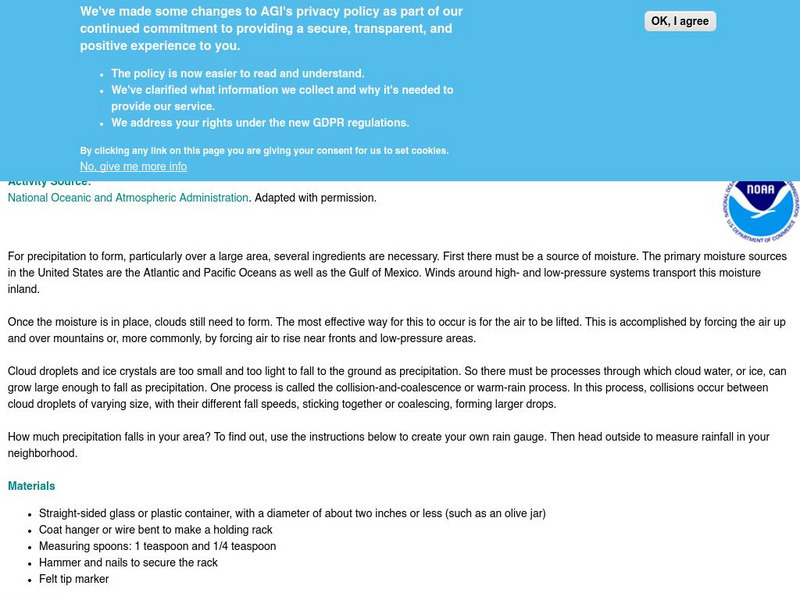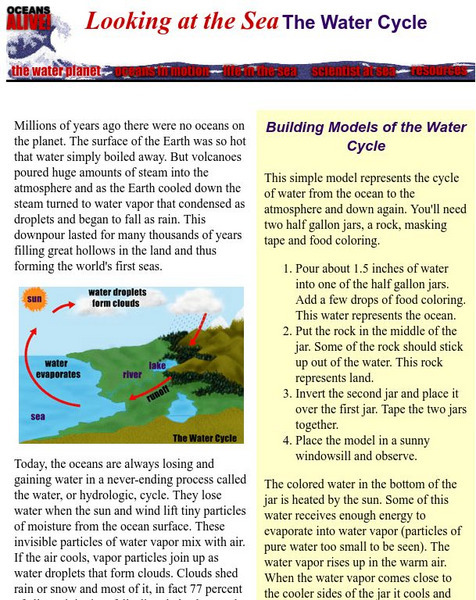University of Victoria (Canada)
Weather Watch: Water Cycle
Excellent discussion and illustration of the water cycle. Explained in an easy to understand format.
University Corporation for Atmospheric Research
Ucar: The Water Cycle
This site provides a comprehensive introduction to the water cycle. Students construct a model to simulate parts of the water cycle. Includes background information, links to standards, lesson plans, and assessment ideas.
American Geosciences Institute
American Geosciences Institute: Earth Science Week: Build a Rain Gauge
In this experiment, students build and calibrate a rain gauge and use it to measure and record how much rain falls in their local area each time it rains.
Museum of Science
Oceans Alive: The Water Planet
Check out this simple overview of the water cycle and learn how to build a model of the water cycle.
American Geosciences Institute
American Geosciences Institute: Earth Science Week: Water: A Never Ending Story
Students carry out a number of activities that demonstrate the concepts of evaporation, condensation, precipitation, and soil moisture and runoff. Then students construct a terrarium as a way to observe the water cycle. Immediately...
Other
K 3 Learning Pages: Web Resources Thunderstorms
Check out this comprehensive list of web resources on thunderstorms and safety. Students and teachers will benefit from the links found on this site.
Science Struck
Science Struck: A List of All Weather Symbols and Their Meanings
Provides a comprehensive list of weather symbols used on weather maps.
Science Struck
Science Struck: Limiting Factors in the Desert Ecosystem
Describes conditions in a desert that limit how large populations of species can grow.
University Corporation for Atmospheric Research
Ucar: Will It Rain, Sleet, or Snow?
Can you predict if it will rain, sleet, or snow? Test your forecasting skills.
University Corporation for Atmospheric Research
Ucar: Snowflakes
Learn about snowflakes and how they are formed.
University Corporation for Atmospheric Research
Ucar: The Water Cycle
Water can be in the atmosphere, on the land, in the ocean, and underground. It moves from place to place through the water cycle.
The Franklin Institute
Franklin Institute Online: Keep Your Own Weather Journal
This site, which is provided for by the Franklin Institute Online, gives a format for keeping a weather journal.
National Weather Service
National Weather Service: Jet Stream: Climate
The Online School for Weather discusses the world's major climate categories based upon general temperature profile related to latitude.
The Franklin Institute
Franklin Institute Online: Make Your Own Rain Gauge
Make a simple rain gauge to measure the precipitation.
Center for Educational Technologies
Earth Science Explorer: The Water Cycle
This is a very brief overview of the water cycle, but it does have a nice graphical representation.
CK-12 Foundation
Ck 12: Fifth Grade Science: Earth Science: Water on Earth
[Free Registration/Login may be required to access all resource tools.] Discusses water and where it occurs on Earth, gives an overview of the water cycle, and explains how the ocean is an integral part of the water cycle and is...
CK-12 Foundation
Ck 12: Earth Science: Processes of the Water Cycle Study Guide
[Free Registration/Login may be required to access all resource tools.] This study guide summarizes key points about the water cycle. Includes a few questions to check for understanding.
Success Link
Success Link: Water Cycle
A lesson plan to show young scholars' understanding of the water cycle through illustrations, and their ability to write creatively about it.
Discovery Education
Discovery Education: Weather Maps
This site provides a lesson plan in which groups of students will each investigate a different type of weather map use for weather forecasting. Also includes discussion questions, extension ideas, and links to additional sites for more...
University Corporation for Atmospheric Research
Ucar: Rain Measurements Tell a Story
Using language arts, math, and measurement skills, elementary students explore rainfall data and learn how to measure precipitation through an interactive story.
Alabama Learning Exchange
Alex: Water Cycle Model
This hands-on model of the water cycle is a great culminating activity for a study of the movement of water through the environment. Completed in small groups or as a class project, it involves connecting three bottles to demonstrate the...
Alabama Learning Exchange
Alex: The Water Cycle
This is an introductory lesson on the water cycle. The internet will be used to help teach the cycle. The student will end the lesson by making his/her own water cycle for observation.This lesson plan was created as a result of the Girls...
Alabama Learning Exchange
Alex: The Water Cycle
This is a hands applied lesson plan to help students experience the water cycle on a smaller scale. Because of the hands-on nature of the lesson, it works well to help students with a language barrier understand complicated vocabulary.
University Corporation for Atmospheric Research
Ucar: The Water Cycle and Climate Change
Water moves from place to place through the water cycle, which is changing as climate changes. Learn how the water cycle is changing as global temperatures rise.













